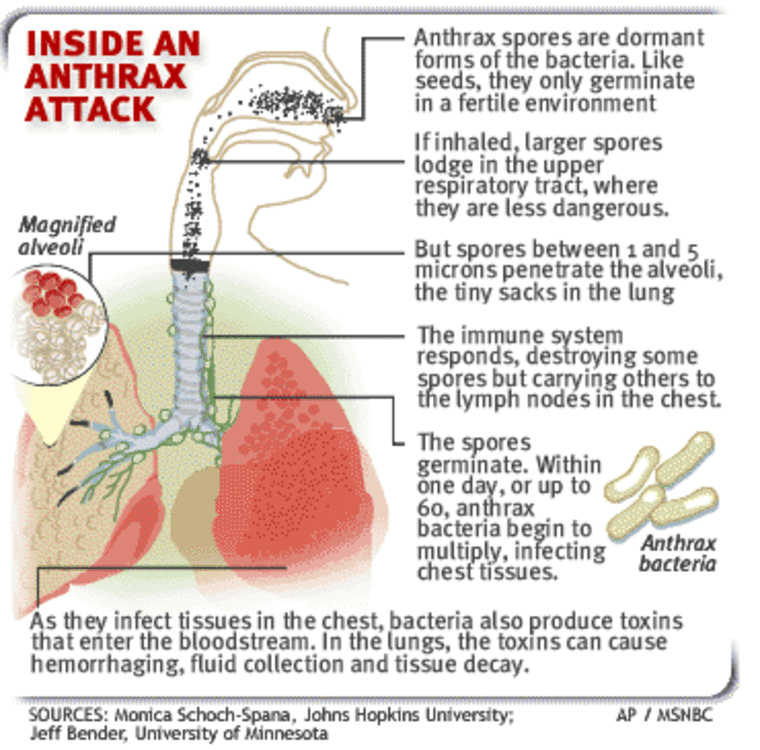The possibility that a photo editor for the weekly tabloid The Sun was killed in a bioterrorism attack took on a new sense of urgency today after Florida public-health officials disclosed that a nose swab taken from a 73-year-old hospitalized co-worker contained the rare bacteria spore that induces Anthrax, an often-fatal illness.
PUBLIC-HEALTH OFFICIALS confirmed that Ernesto Blanco, a 73-year-old Cuban-American who works in the mailroom of American Media office building in Boca Raton tested as having been exposed to Anthrax. Blanco was admitted to a Miami hospital last week with symptoms of pneumonia. On Friday, Bob Stevens, a photo editor at The Sun, died from disease.
What had been described as a public-health probe instantly became a criminal investigation as FBI agents on Sunday evening sealed off the office building, which houses the offices of most of the country’s supermarket tabloids including The National Enquirer, The Star, The Globe, News of the World and others. Employees and visitors to the building were ordered to undergo medical tests. Grim-faced state officials who had initially tried to downplay speculation late last week that Stevens’s demise might have been caused by foul play didn’t sound so sure at a Monday afternoon press conference. “We can’t speculate as to the source of this particular anthrax germ,” said acting Florida Secretary of Health Dr. John Agwunobi, who confirmed earlier reports that Anthrax spores had been found on the computer keyboard at Bob Stevens’s desk. Other officials went further. “We have to assume that a human element was involved,” concluded Florida Health Department director of disease control Dr. Landis Crockett.

NEWSWEEK has learned that the FBI is aggressively trying to locate a summer intern from nearby Florida Atlantic University in connection with the investigation. The intern, who sources said came from a Middle Eastern country, had sent an e-mail to all employees that a top American Media official described as “peculiar.” The e-mail thanked company employees for the help he gave them, but then contained language suggesting that he wasn’t saying “goodbye.” Another company official recalled the email as having “a sense of foreboding” and referring to a “surprise” or “something that he left behind.” Said the official, “it was weird.”
Sources at American Media said the FBI has asked company employees about any “enemies” the company or its papers might have. Given the content of the weekly tabloids, “that list would go on forever,” joked one employee. Alarmed workers say they are urgently trying to recall receiving suspicious or unusual letters and packages. Several are focusing on a letter that arrived at the company about a week before the Sept. 11 terrorist attack. It was described by sources as a “weird love letter to Jennifer Lopez”—similar, outwardly, to the types of mail the tabloids often get. But inside the oddly-worded letter was what was described as a “soapy, powdery substance” and in the pile of that a cheap Star of David charm. The letter, per routine, was taken in by the joint mailroom of the company. Employees said the letter was handled both by Stevens and Blanco.
By late Monday afternoon, Boca Raton fire rescue vehicles and unmarked trucks and vans had descended on the American Media office building and investigators in white germproof suits were combing the ramp leading into the underground parking lot. Earlier in the day, hundreds of office workers filled out four-page forms at the Delray Beach health center asking them questions about their medical history, any recent unusual events that had occurred inside the building and whether they had visited the mail room and a photo library frequented by Blanco and Stevens.
The office workers were issued 15-day supplies of the antibiotic Cipro that doctors prescribe in cases of Anthrax exposure. A skittish golf pro who works at a course adjacent to the premises of the American Media headquarters looked on warily from a distance as law enforcement officials swarmed around the building this morning. “I’m very concerned, and I’m going to give my lessons on the far side of the course,” said Broken Sound Golf Course instructor Michael Meredith. “I’m going to try to stay as far away as possible.” He was not alone in voicing such sentiments on a day when the specter of bioterrorism suddenly loomed large over the placid suburbs of Palm Beach County.
With Catharine Skipp
© 2003 Newsweek, Inc.